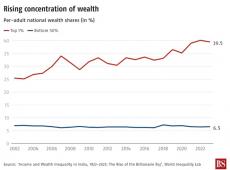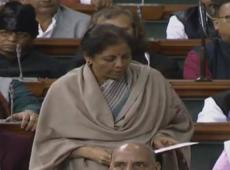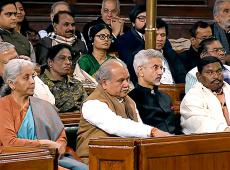India Needs Care Economy Reforms to Address 'Motherhood Penalty': Survey
By Rediff Money Desk, New Delhi Jul 22, 2024 15:57
India faces a 'motherhood penalty' with a drop in female labor force participation. The Economic Survey 2023-24 calls for strategic reforms to build a strong care economy.

Illustration: Uttam Ghosh/Rediff.com
New Delhi, Jul 22 (PTI) Strategic reforms are required to build a solid care economy structure in India, as the country faces the challenge of 'motherhood penalty' with a drop in female labour force participation rate around childbearing years, the Economic Survey 2023-24 said on Monday.
The survey estimated that direct public investment equivalent to 2 per cent of the GDP has the potential to generate 11 million jobs in the sector, nearly 70 per cent of which will go to women.
Subsidising care services can be considered, said the survey, asserting that the successful international models of Australia, Argentina, Brazil, and the US in this sector may offer valuable insights for India. These countries provide financial assistance through vouchers and tax rebates to the care workers based on their income, child's age, number of offspring, etc.
"The economic value of developing a care sector is twofold - increasing female labour force participation rate (FLFPR) and promoting a promising sector for output and job creation. According to International Labour Organisation (2018), the care sector is one of the fastest-growing sectors globally, and investments in the care services sector are estimated to generate 475 million jobs globally by 2030.
"In the case of India, direct public investment equivalent to 2 per cent of GDP has the potential to generate 11 million jobs, nearly 70 per cent of which will go to women," the survey stated.
It pointed out that a wide range of research has emphasised the impact of affordable and reliable child-care on freeing women's time for paid employment, enhancing mental health and improving children's learning and nutrition. However, it said the literature on this is mainly foreign and empirical studies on India are scarce.
According to the survey, the impact of childbearing and child-care is found to have a significant cost on women's careers. This 'motherhood penalty' is depicted as a drop in FLFPR around childbearing years and a loss of income.
Women tend to be concentrated in farming and informal jobs as a result of 'motherhood penalty' as those workspaces are compatible with their personal care responsibilities, the survey said citing a study.
Even though the time spent on unpaid care work per day is only 9 minutes higher for rural women vis-a-vis urban women, higher rural FLFPR could be explained by the flexibility, in terms of timing and proximity of employment, which allows child supervision, which rural jobs typically provide, it said quoting another study.
Asserting that strategic reforms are required to build a solid structure of the care economy, the survey recommends support for parental leave policies; subsidies for care services; public and private investments in building care infrastructure; mechanisms for skill training for care workers; and mechanisms for monitoring service quality and benchmarks.
It highlighted the need for setting up a dedicated Care Sector Skills Council to help develop a skill training framework for the care sector, formulate skilling modules, and undertake partnerships with international skill training institutes.
"Public-private partnerships (PPP) could play a significant role in building the care infrastructure, especially institutions for child-care and the elderly. Policies may be formulated to invest in mobile creches in offices, hospitals, and other public areas, encouraging women to take up paid employment opportunities," said the survey.
The survey estimated that direct public investment equivalent to 2 per cent of the GDP has the potential to generate 11 million jobs in the sector, nearly 70 per cent of which will go to women.
Subsidising care services can be considered, said the survey, asserting that the successful international models of Australia, Argentina, Brazil, and the US in this sector may offer valuable insights for India. These countries provide financial assistance through vouchers and tax rebates to the care workers based on their income, child's age, number of offspring, etc.
"The economic value of developing a care sector is twofold - increasing female labour force participation rate (FLFPR) and promoting a promising sector for output and job creation. According to International Labour Organisation (2018), the care sector is one of the fastest-growing sectors globally, and investments in the care services sector are estimated to generate 475 million jobs globally by 2030.
"In the case of India, direct public investment equivalent to 2 per cent of GDP has the potential to generate 11 million jobs, nearly 70 per cent of which will go to women," the survey stated.
It pointed out that a wide range of research has emphasised the impact of affordable and reliable child-care on freeing women's time for paid employment, enhancing mental health and improving children's learning and nutrition. However, it said the literature on this is mainly foreign and empirical studies on India are scarce.
According to the survey, the impact of childbearing and child-care is found to have a significant cost on women's careers. This 'motherhood penalty' is depicted as a drop in FLFPR around childbearing years and a loss of income.
Women tend to be concentrated in farming and informal jobs as a result of 'motherhood penalty' as those workspaces are compatible with their personal care responsibilities, the survey said citing a study.
Even though the time spent on unpaid care work per day is only 9 minutes higher for rural women vis-a-vis urban women, higher rural FLFPR could be explained by the flexibility, in terms of timing and proximity of employment, which allows child supervision, which rural jobs typically provide, it said quoting another study.
Asserting that strategic reforms are required to build a solid structure of the care economy, the survey recommends support for parental leave policies; subsidies for care services; public and private investments in building care infrastructure; mechanisms for skill training for care workers; and mechanisms for monitoring service quality and benchmarks.
It highlighted the need for setting up a dedicated Care Sector Skills Council to help develop a skill training framework for the care sector, formulate skilling modules, and undertake partnerships with international skill training institutes.
"Public-private partnerships (PPP) could play a significant role in building the care infrastructure, especially institutions for child-care and the elderly. Policies may be formulated to invest in mobile creches in offices, hospitals, and other public areas, encouraging women to take up paid employment opportunities," said the survey.
Source: PTI
DISCLAIMER - This article is from a syndicated feed. The original source is responsible for accuracy, views & content ownership. Views expressed may not reflect those of rediff.com India Limited.
You May Like To Read
TODAY'S MOST TRADED COMPANIES
- Company Name
- Price
- Volume
- GTL Infrastructure
- 2.76 (+ 3.76)
- 403643100
- YES Bank Ltd.
- 25.67 (+ 3.59)
- 39175439
- Vodafone Idea L
- 15.89 (+ 0.06)
- 38020100
- Khoobsurat
- 1.56 (+ 4.70)
- 28455818
- NCL Research
- 0.91 (+ 4.60)
- 18225834
MORE NEWS

Sanstar IPO Over-Subscribed 13.47 Times on Day 2
Sanstar Ltd's IPO received 13.47 times subscription on the second day, with strong...

JNPA to Build Rs 285 cr Agri Processing Facility
JNPA receives approval to build India's first agricultural commodity-based processing...

Sebi Finds No Evidence of Unfair Trading on...
Sebi has not received any specific information on unfair trading during the stock...












 © 2024 Rediff.com India Limited. All rights reserved.
© 2024 Rediff.com India Limited. All rights reserved.